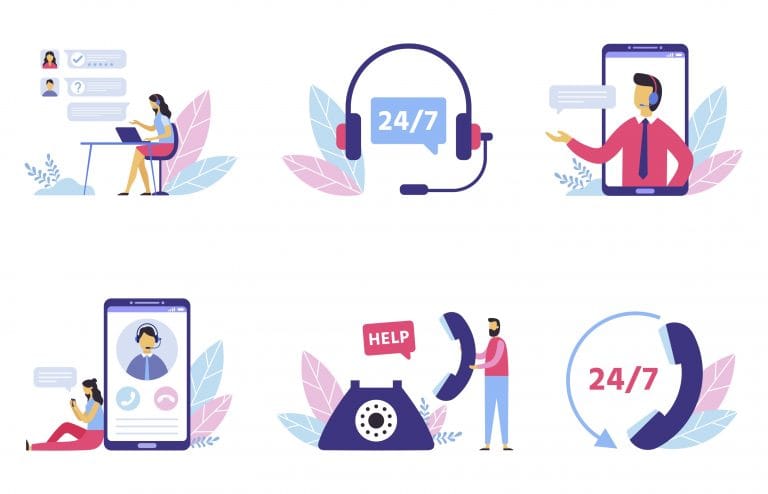Goodbye landlines, hello VoIP.
Voice over Internet Protocol (VoIP) has revolutionized the way we communicate. In today’s fast-paced world, with businesses operating on a worldwide scale and remote workforces growing everyday, offering a flexible and cost-effective alternative to traditional phone systems is the difference between setting your business up for success–or not.
If you’re new to VoIP, this beginner’s guide will provide you with a comprehensive understanding of what VoIP is, how it works, and the plethora of benefits that it offers. Let’s delve into the world of VoIP and unlock its potential it has for your business.
What is VoIP?
VoIP, or Voice over Internet Protocol, is a technology that allows you to make phone calls using an internet connection instead of traditional phone lines. It converts analog voice signals into digital data packets, which are transmitted over the internet to reach the intended recipient. VoIP offers a more efficient and versatile communication solution compared to traditional phone systems.
How Does VoIP Work?
VoIP works by breaking down voice signals into digital data packets and transmitting them over the internet. These packets are routed through IP networks, reaching their destination where they are reassembled into voice signals. VoIP can work with various devices, including IP phones, computers, smartphones, and tablets, offering flexibility and convenience.
Key Components of VoIP:
Understanding the key components of VoIP is crucial to grasp how the technology operates. These components include:
- IP Phones or Softphones: These devices serve as endpoints for making and receiving VoIP calls. IP phones resemble traditional telephones, while softphones are software applications that run on computers or mobile devices, turning them into virtual phones.
- VoIP Server: The VoIP server manages call routing, signaling, and other functions required for the smooth operation of VoIP calls.
- Codecs: The term “codec” literally comes from combining the words “compression” and “decompression”. It’s basically an algorithm that is used to compress audio or video, and allows for high-quality content to be transmitted over the internet.
- Internet Connection: You can’t have a VoIP connection without an internet connection. The stronger your internet connection, the better call quality you’ll receive. Afraid that your internet might go out? You’re in luck: SpectrumVoIP offers Automatic Failover, a feature that ensures your VoIP connection remains intact and functioning, even in the event of an outage or network failure.
Benefits of VoIP:
VoIP offers an insane amount of benefits for businesses of literally any size. If you need phones to communicate with customers, clients, and employees, then VoIP is the communication infrastructure you want to obtain. Here’s a few reasons why:
- Cost Savings: VoIP eliminates the need for dedicated phone lines and reduces long-distance call charges. It offers more affordable rates for both local and international calls, allowing your business to function at a high level with significant cost savings.
- Flexibility and Mobility: VoIP allows you to make and receive calls from anywhere in the world, as long as there’s an internet connection. It’s an ideal system for businesses that have a remote workforce and for businesses with multiple locations.
- Feature-Rich Solutions: VoIP comes with a ton of features that enhance communication. Some of the most popular features include call forwarding, voicemail, call recording, auto-attendant, video conferencing, and much more. These features empower you to improve team productivity and enhance collaboration.
- Scalability: VoIP can easily scale up or down to accommodate the changing needs of your business. Adding or removing phone lines, expanding to new locations, or adapting to seasonal fluctuations becomes virtually hassle-free when you have a VoIP system in place.
- Integration with Business Systems: VoIP integrates smoothly with many business applications, such as CRM platforms, email systems, and collaboration tools. This makes it an excellent way to enhance efficiency and streamlining workflows without having to experience any downtime during installation.
VoIP Security Considerations:
Security is one of the most crucial aspects of VoIP. Protecting your communication data from potential threats is vital, especially with those who try to steal data having AI on their side.
VoIP systems can implement security measures like encryption, firewalls, and secure protocols to safeguard against unauthorized access and eavesdropping. We recommend finding a reputable VoIP provider that makes security a priority.
All in all, VoIP offers a modern and versatile communication solution. It is revolutionizing the way we connect with others, and offers an easy-to-use, reliable, and updated way of communicating with your customers and clients. To find the best plan and lowest rate for your business, visit us here.

